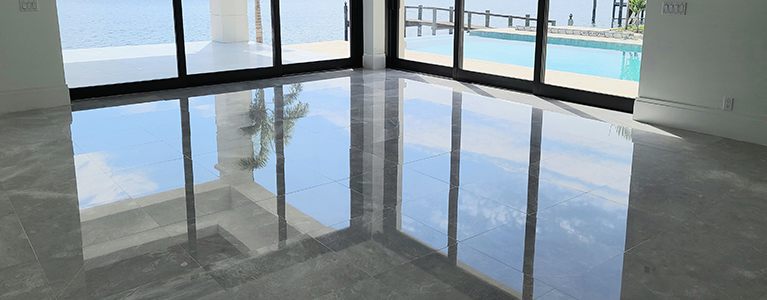Taking Care of Natural Stone Surfaces
Natural stone is a beautiful, durable, and timeless investment for home, business, yacht owners and more throughout Florida. Residents choose natural stone for their flooring, outdoor spaces, bathrooms, and kitchen countertops. Natural stone surfaces must be cared for properly to ensure that they remains pleasing for years to come.
Natural stone surfaces can become stained, cracked, chipped, or otherwise damaged if not cared for properly. Some types of natural stone are more susceptible to damages than others. It is important to practice special care, cleaning, and maintenance to avoid these potential costly instances.
The following informational guide will examine how to take care of the natural stone in your home, business, or yacht. We will also discuss potential issues and when you should seek professional care from a natural stone expert.
Identify Your Natural Stone

There are numerous types of natural stone that are selected based on appearance, durability, and price. Common choices include:
- Marble
- Travertine
- Granite
- Limestone
- Onyx
- Quartzite
- Terrazzo
These stones are often used for kitchen countertops, bathroom tiling, and floors in homes and yachts. Many can also be found in outdoor spaces and commercial buildings.
Protecting Natural Stone Surfaces

The most effective way to take care of all natural stone surfaces is to prevent damages from occurring. There are certain things that should never be done to your stone floor, countertops, or outdoor areas, including:
- Never use acidic cleaners, including grout cleaner, bleach, or ammonia on any natural stone surface. These will not remove stains and only damage the stone.
- Never use scrub pads or other abrasive tools to clean your stone. Marble is particularly prone to scratches and damage.
- Never leave potentially damaging products, even in their containers, on natural stone. These products could leak, go unnoticed, and cause extensive damage.
You should always use a cutting board and never cut directly on your stone countertop.
General Cleaning

All types of natural stone should be cleaned and cared with cleaners specifically made for them. Dish soap and water can be used occasionally but should be avoided because it can result in a film and leave behind residue.
Never leave a spill on any stone surface. Generally, hot water and a soft towel will be sufficient for cleaning up general spills. All stone surfaces can stain; however, marble and limestone are particularly suspectable to staining.
Always use coasters to avoid any potential water damage that could result from condensation.
Stone Flooring

Stone flooring is an investment that must be properly cared for to decrease the likelihood of expensive damages. There are several general care tips that should be followed for all types of natural stone flooring, including:
- Use a dust mop regularly to clean stone flooring.
- Never soak any natural stone with water when cleaning it.
- Use non-slip rugs and mats to protect stone flooring.
- Place protective pads underneath furniture to prevent scratches and other damages to your stone flooring. Never push furniture to move it across a stone floor.
You should also have your stone flooring regularly maintained by a professional who is qualified to service natural stone. This may include regular sealing, polishing, and/or repairs as needed.
Porous Natural Stone Surfaces Require Special Care

Although all stone can be stretched or damaged, there are specific types of stone that are at a higher risk of damage.
Marble, onyx, limestone are the most porous of natural stones. This makes them more suspectable to acid erosion, resulting in dull spots, known as etching. Never place acidic cleaners and/or food on these surfaces.
Porous stone is also prone to staining, including stains from cooking oils and spills. These surfaces must be regularly sealed to avoid this.
When to Contact Professional Maintenance, Repair, and Restoration

There are several instances where you must contact a professional to handle your natural stone needs.
Old Damaged Stone
If you have recently bought a home, business, or yacht, it may have stone that had been neglected by previous owners.
You should call a professional stone expert to confirm the type of stone and assess it for damage. It is likely that an expert will need to use their tools and expertise to before natural stone restoration for these surfaces.
Chips, Cracks, Etching
Always contact a stone professional if you notice any new chips, cracks, or etching on your natural stone surfaces. There is no way to effectively fix these yourself. Trying to do so will not correct the issue or be aesthetically pleasing.
You may need a professional to polish the surface with a special machine that uses friction to resmooth and beautify the stone.
Stains
When the natural stone surface becomes stained, the penetration is deep within the surface. There are several types of stains, including oils, coffee, and wine. If a stain does not come off with regular stone cleaner and water then you must contact a professional.
Never use a harsh cleaner, including all-purpose cleaner or bleach, in an attempt to remove the stain. This will only further damage the surface.
Just Call Classic

Just Call Classic Inc. employs a team of experienced and qualified stone maintenance, repair, and restoration experts who are proud to serve the people of South Florida. Just Call Classic Inc. specializes in all types of natural stone and provides numerous services, including:
- Polishing
- Honing
- Repair
- Restoration
- General Maintenance
Just Call Classic is proud to be only trusted team of stone professionals in the Broward, Dade, and Palm Beach Area. Reach out to Just Call Classic today for more information and let them help you care for the stone in your home, business, or yacht.
